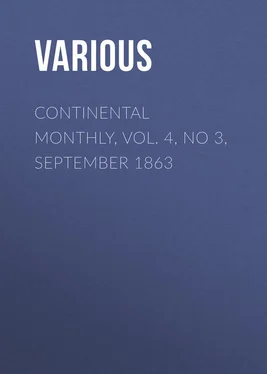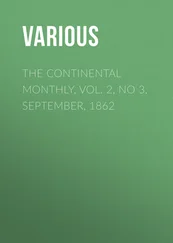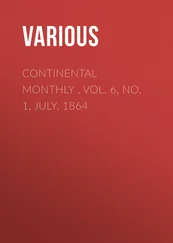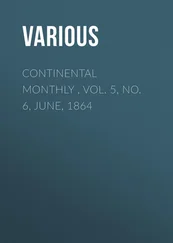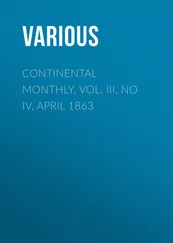Various - Continental Monthly, Vol. 4, No 3, September 1863
Здесь есть возможность читать онлайн «Various - Continental Monthly, Vol. 4, No 3, September 1863» — ознакомительный отрывок электронной книги совершенно бесплатно, а после прочтения отрывка купить полную версию. В некоторых случаях можно слушать аудио, скачать через торрент в формате fb2 и присутствует краткое содержание. Жанр: periodic, Языкознание, periodic, foreign_edu, на английском языке. Описание произведения, (предисловие) а так же отзывы посетителей доступны на портале библиотеки ЛибКат.
- Название:Continental Monthly, Vol. 4, No 3, September 1863
- Автор:
- Жанр:
- Год:неизвестен
- ISBN:нет данных
- Рейтинг книги:3 / 5. Голосов: 1
-
Избранное:Добавить в избранное
- Отзывы:
-
Ваша оценка:
- 60
- 1
- 2
- 3
- 4
- 5
Continental Monthly, Vol. 4, No 3, September 1863: краткое содержание, описание и аннотация
Предлагаем к чтению аннотацию, описание, краткое содержание или предисловие (зависит от того, что написал сам автор книги «Continental Monthly, Vol. 4, No 3, September 1863»). Если вы не нашли необходимую информацию о книге — напишите в комментариях, мы постараемся отыскать её.
Continental Monthly, Vol. 4, No 3, September 1863 — читать онлайн ознакомительный отрывок
Ниже представлен текст книги, разбитый по страницам. Система сохранения места последней прочитанной страницы, позволяет с удобством читать онлайн бесплатно книгу «Continental Monthly, Vol. 4, No 3, September 1863», без необходимости каждый раз заново искать на чём Вы остановились. Поставьте закладку, и сможете в любой момент перейти на страницу, на которой закончили чтение.
Интервал:
Закладка:
But with all this as an offset, still there is an undeniably strong and unscrupulous faction there, composed of the leading minds of the South, acute, imperious, sophistical, used to political and social rule, and backed by a small but cunning minority here at the North, so vile and contemptible that, in comparison with its adherents, they, these slave oligarchs, are 'Hyperion to a satyr.' These, with the thousands both North and South, misled and befooled by them, form the formidable opposition with which the Government is even now closing in a life-or-death encounter. These represent one of the two grand ideas at last met in a decisive struggle on this North American Continent, after the numberless petty skirmishes, reconnoissances, and lesser conflicts which have stained the battle fields of the world with the best blood of humanity during so many thousand years. No child's play now – no diplomatic dissembling – no sword thrusts intended to be parried, no machiavelian hits nor disguises. The fight is close, desperate, deadly; it is yard arm to yard arm; it is heart seeking for naked heart, flashing eye to eye, visor down, and hot breath mingling with hot breath, as the foes close in the last grapple. The other idea is embodied in the principles of the Constitution and the Declaration of Independence, and is represented by the Federal authority. The South, then, is taken to mean the one, and the North, its opposite. On one side barbarism, slavery, injustice, ignorance, despotism, the woes and maledictions of oppressed races, the carnival of fiends; on the other, civilization, freedom, justice, education, republicanism, the gladness and gratitude of redeemed humanity, the jubilee of joy among angels. On the side of disunion, endless bickerings, intestine wars, standing armies, crushing debts, languishing commerce, all improvement at a stand still, tyranny settling darkly down over the liberties of the people and of individuals, and national influence gone forever. On the side of Union, honorable peace, legitimate expansion, social order and improvement, increasing commerce, the education and elevation of the masses, the path of success open to all, the freedom and rights of all, even the least and poorest secured, and the nation occupying a front rank among nations, her flag loved no less than feared, her government the model one of the world, and the great experiment of self-government safe beyond the peradventure of failure. Who doubts the issue of such a struggle – who would cheat himself of being one with God and good men in the glory of a triumph so possible and certain?
But why is it that the hate of all rebels, North and South, is so malignantly directed toward New England especially? What has she done more than New York or Illinois? Again I reply, it is not geographical New England that is so feared and hated, but the ideas she represents. I have called these, already, the Northern idea. But if the nature of our political philosophy be closely scanned, if we exactly analyze the genius of our institutions in their proper and unbiased action, we shall be forced to acknowledge that it was the Puritan idea which predominated; that it is, in fact, the saving clause in the gospel of our national salvation. And New England was the first home of the Puritans – the focus from which have radiated the myriad beams of the light of which they were the repositories to the remotest corners of the land. Let no one be alarmed at the mention of the word Puritan . There are some people who have no other notion of a Puritan than that of a close-cropped, saturnine personage, having a nasal twang, who is forevermore indulging an insane propensity to sing psalms, quote Scripture, or burn witches. These are the people who can never see into the profound deep of a great truth, but are quite ready to laugh at its travesty or caricature. And what high or holy truth has not been caricatured? For one, I envy not the head or the heart of him who can think the name of Puritan a badge of shame or reproach, and who has no sympathy nor admiration for the stern resolution, the wondrous fortitude, the deep enthusiasm for freedom, the unwavering faith, and the high religious devotion of those men and women who first lit a torch in the wilderness, soon to become the beacon light of the world.
Nor would I be understood to mean a wholesale and indiscriminate adoration of the Puritans as a sect . The appellation, which was bestowed upon them in opprobrium, and which they certainly wore in no meek manner, but evidently gloried in as a word of highest praise and honor, I use as a convenient one to characterize the idea I would represent. These men were but the chosen instruments in the hands of Him who no doubt has ever ordered the course of affairs in the world, to open up a new epoch in its history. The time was ripe – the men had been moulded – and through them the free principles which had been culminating through the ages, which had stirred the souls, animated the imaginations, and quickened the desires of the best and noblest of the race from its birth till now, were at last to find a resistless voice, a limitless scope, an unrepressed expansion, on a new and magnificent theatre. For freedom is of no time, nor clime, nor color, nor sect, nor nationality. She is the primal gift of God to his intelligent creatures, and is the kingly dower of every human soul. She was not born with the Puritans, nor did she die with them. In no age or land, among no sect or people, has she been without her priesthood, her altar, her ritual, her heart worship. Nor is she to blame for the wrongs and atrocities committed in her name. The ideas and principles the Puritans were ordained to carry out and embody in a great political structure were of the noblest, rarest, most enduring and beneficent; the faults that marred the beauty and consistency of their own character, were the exaggerations of their virtues, and arose from the frailty and instability of the human heart, even when most governed and inspired by the highest motives. The principles remain steadfast, immovable, immortal; the defects we can but grieve over and forgive for the sake of the grandeur they only marred but could not destroy.
Читать дальшеИнтервал:
Закладка:
Похожие книги на «Continental Monthly, Vol. 4, No 3, September 1863»
Представляем Вашему вниманию похожие книги на «Continental Monthly, Vol. 4, No 3, September 1863» списком для выбора. Мы отобрали схожую по названию и смыслу литературу в надежде предоставить читателям больше вариантов отыскать новые, интересные, ещё непрочитанные произведения.
Обсуждение, отзывы о книге «Continental Monthly, Vol. 4, No 3, September 1863» и просто собственные мнения читателей. Оставьте ваши комментарии, напишите, что Вы думаете о произведении, его смысле или главных героях. Укажите что конкретно понравилось, а что нет, и почему Вы так считаете.
